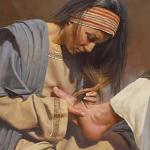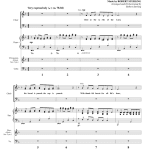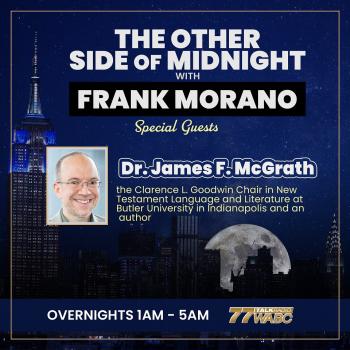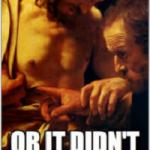Working through the Gospel of John in my Sunday school class, we conveniently reached the passion narrative close to Holy Week. Of course, we’ll still be talking about these texts for weeks to come, and so it is not as though there’s a precise alignment. But there is still something nice about having this sort of convergence occur.
We considered what appears to be John’s creative change to the timing of Jesus’ last supper and crucifixion, making the final meal not a Passover celebration so that Jesus can die at the time the Passover lambs were being slaughtered. But what, I asked, is the connection between Jesus and Passover? I brought us back to the imagery offered towards the beginning of the Gospel of John: Behold, the Lamb of God who takes away the sin of the world.
Does that have anything to do with Passover?
At first glance, it wouldn’t seem to. Passover was not about sacrifice of the ordinary sort, nor was it like Yom Kippur, the use of animals in a manner that explicitly has to do with forgiveness. The placement of blood on lintels in the Exodus story doesn’t seem to have anything to do with forgiving the sins of firstborn sons. And the ongoing celebration of Passover was likewise not focused on rituals of forgiveness or atonement.
In a sense the most natural place to look for an animal taking away sin is the “scapegoat” from the Day of Atonement ritual. Precisely because sins were symbolically transferred to the animal, it was not slaughtered as a sacrifice.
But John doesn’t say Jesus is the “Goat of God” who takes away the sin of the world.
(As an aside, Exodus says that the Passover lamb can be taken from among the sheep or the goats, which means that the “Goat of God” still could have had a Passover connection. But could anyone have heard “Lamb of God” and thought of the scapegoat?)
And so I suggested that perhaps the appropriate thing to do is to revisit and reconsider the language in John 1 in light of the way John draws to a close with a focus on Jesus as Passover lamb. Does Passover have anything to do with “taking away the sin of the world”? The answer will only seem to be “no” if one understands sin in narrowly individualistic terms. But if one recognizes in the enslavement of the Hebrews in Egypt a portrait of what sin in the world can look like, then there clearly is a relationship. To take away the sin of the world cannot be a purely individualistic thing, if we think about it. Some might believe that dealing with individual sin sorts out communal and societal problems. But there is significant evidence to the contrary. And if one thinks of “dealing with sin” as a matter of forgiveness rather than transformation – whether individual, communal, or ideally both – then the problem is compounded.
What do others think? It is commonplace to note how John highlights connection between Jesus’ death and Passover. But it is much less common to encounter detailed reflection on what the connection might be, what the author of the Gospel might have wanted readers to understand and take away. How do you understand the connection the Gospel of John makes?
Of related interest:
https://www.patheos.com/blogs/godlessindixie/2019/04/13/a-religion-obsessed-with-blood/













